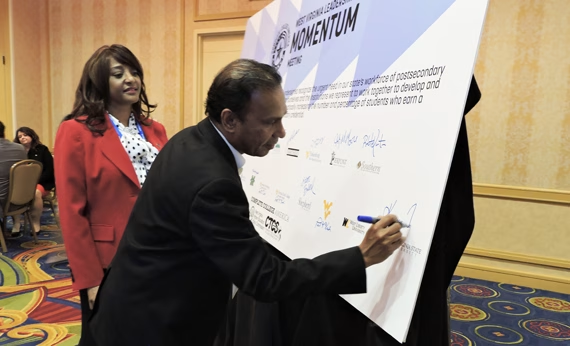CHARLESTON, W.Va. – West Virginia higher education leaders committed Tuesday, Feb. 27, to the state’s Momentum Pathways Project, a program that uses proven strategies to improve student success during the first year of college and sustain that momentum through to graduation. The group representing the state’s public higher education institutions met Tuesday along with national experts to discuss strategies that increase student retention and graduation. The event was hosted by the West Virginia Higher Education Commission (HEPC), the Community and Technical College System of West Virginia (CTC), and Complete College America (CCA). The Momentum Pathways Project will focus on 15 to Finish, adviser training, and the use of degree maps. A research-based initiative originally launched in Hawaii, 15 to Finish encourages students to take 15 credit hours per semester or 30 per year, increasing their likelihood of success and ensuring that they graduate on time. “West Virginia State University is committed to not only offering access to a quality education, but ensuring that our students complete their degrees in a timely manner,” said WVSU President Anthony L. Jenkins. “One of my first initiatives as president was to introduce our University’s own 15 to Finish program. Such efforts are imperative if we are to continue to move the needle on retaining more students and improving our four- and six-year graduation rates.” Efforts around adviser training and degree maps will simplify the maze of academic courses and student requirements by creating easy to follow academic maps, design support services that increase success for adult learners, and create structured schedules that allow students to balance work, life, and academics. “The convening of West Virginia’s higher education leaders to launch the Momentum Pathways Project is key to reaching the Commission’s strategic goals of access, success and impact,” said Dr. Paul L. Hill, Chancellor of the West Virginia Higher Education Policy Commission. “By creating momentum around these pathways, it makes progress possible towards reaching our state’s educational and workforce needs – both now and in the future. I commend the leadership of our state higher education institutions for committing to this important work.” Dr. Sarah Tucker, chancellor of West Virginia’s community college system, said within the next two years, more than 51 percent of West Virginians will need formal education or training beyond high school if they want a good job.
“We have a great deal of work before us to meet this goal,” Tucker said. “With our college and university presidents and academic and advising teams on board, along with the support from the state and national level you’re seeing here today, I am confident we can make a real difference in the lives of our students, their families and the companies they will work for right here at home.” Since 2012, West Virginia has been working with CCA to increase the number of West Virginians with a certificate or degree beyond a high school diploma. West Virginia has implemented key components of CCA’s strategies with success in recent years, including redesigning developmental education statewide and enrolling more students in 15 or more credit hours per semester. These programs are increasing college student retention rates and promoting timely graduation.

West Virginia State Joins in Campaign to Promote College Completion
February 28, 2018